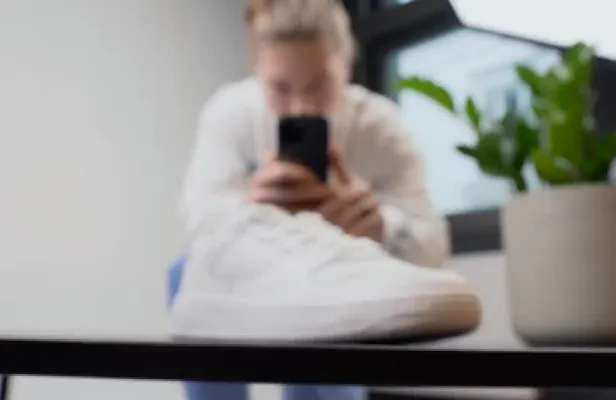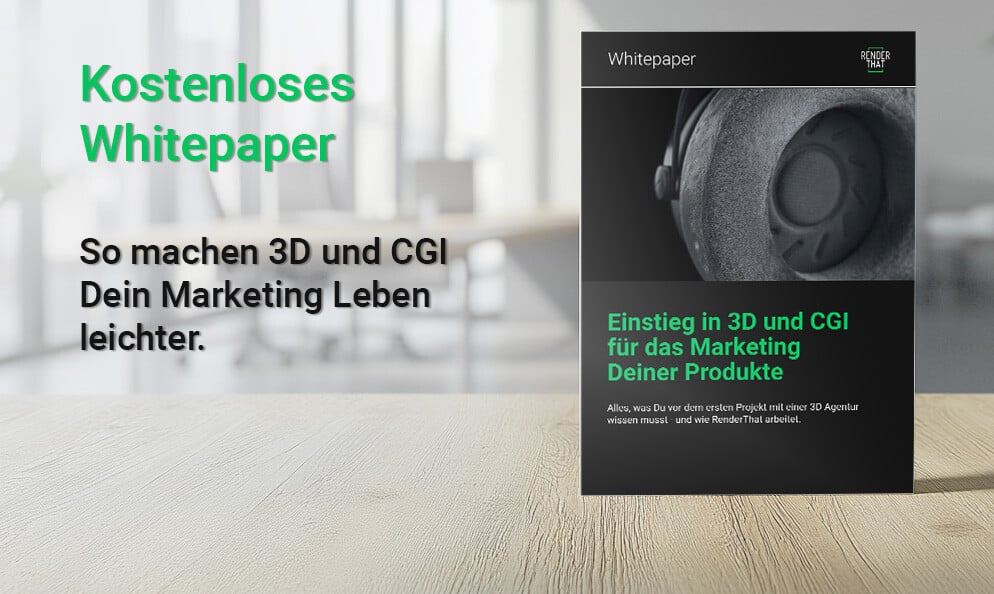3D visualization for kitchens: How to get 3D kitchen renderings

Nowadays, it is essential for companies that sell kitchen products to present their products in a modern, appealing and realistic way. Product and marketing managers are faced with the challenge of presenting their products optimally and reaching customers in the best possible way. The modern solution is 3D visualization. But what is a 3D kitchen visualization exactly and why should you use them for your product marketing? In this article, you'll learn how 3D renderings for kitchens can help you present your products photorealistically and in a way that promotes sales.
What is a 3D visualization for kitchens?
A 3D visualization for kitchens is a digital representation of a kitchen space or individual kitchen components, which is created using special software. These visualizations are so precise and detailed that they look confusingly similar to a real photo. The big advantage of this is that there is no need to organize a physical kitchen model or an elaborate photo shoot. Instead, everything is created digitally, giving unlimited possibilities for variations and designs.
3D renderings make it possible to present kitchen products in different environments, with different colors, materials and lighting situations. They are a powerful tool for activating the customer's imagination and optimally presenting the benefits of a product.
The importance of photorealistic kitchen renderings in marketing
Visual impressions are crucial in marketing. Customers usually buy products not only for their functionality but also for their design and aesthetics. Photorealistic kitchen renderings offer an invaluable advantage here. They make it possible to represent kitchens in such a way that they appear in their perfect form and function — even before they have even been physically manufactured.
Photorealistic visualizations give customers a clear picture of what the kitchen in their home could look like. This not only promotes trust in the product, but also reduces uncertainty when making a purchase decision. Companies can thus address emotions in a targeted manner and strengthen customer loyalty.
The project provides an example of successful implementation of such visualizations BSH Kitchen Interior, in which various kitchen concepts were presented in photorealistic quality.

Why you need 3D kitchen renderings for your product marketing
3D renderings offer much more than just an aesthetic upgrade. They enable a flexible and versatile presentation of products that is difficult to achieve with classic photos. This is particularly advantageous in the kitchen sector, where different materials, colors and layouts often have to be tested and compared.
Realistic presentation for greater persuasion
A major reason why you 3D kitchen renderings You should use for your product marketing is the realistic presentation. Customers want to feel that they are fully experiencing a product before they buy. 3D visualizations can be designed so precisely and in detail that they not only imitate reality, but often even exceed it. This gives the customer a clear idea of how the kitchen will look and function later on.
Flexibility in presentation
With 3D renderings You're not limited to a single design or environment. You can create and present different variations of your products with just a few clicks. Whether it's different color palettes, materials or lighting scenarios — the flexibility that 3D visualization offers you is immense. This enables you to present customers with individual solutions that are tailored exactly to their needs and wishes.
Benefits of 3D renderings compared to classic photos
Traditional photo shoots for kitchen products often require complex preparations, including setting up sets, the right lighting, and creating a suitable environment. This is not only expensive but also time-consuming. 3D renderings have clear advantages here.
- cost savings: Since no physical set is required, there are no high production costs.
- saving time: Changes to a rendering can be made quickly and without much effort. In contrast to another photo shoot, a visualization can be adapted within a very short period of time.
- flexibility: Different versions of a product — whether in different colors, materials, or sizes — can be created at no additional cost. This makes it possible to present a variety of variants without having to produce physical prototypes.
An excellent example of the flexibility of 3D renderings is Musterring Kitchen Concept, in which various kitchen concepts were visualized.
Flexible adjustments: Diverse variations at no additional cost
One of the biggest advantages of 3D renderings is the ability to create an almost infinite number of variations — without high additional costs. Whether you want to visualize different color options, materials, or layouts, 3D technology makes this easy.
Imagine you want to show your customers what a kitchen looks like in both matte white and glossy black. Instead of planning two separate photo shoots, you can simply have both variants created digitally. This not only saves time, but also gives you the freedom to work creatively and present your products in a wide variety of constellations.
How to get professional 3D visualizations of your kitchen
Now that you know the benefits of 3D visualizations for your marketing, the question is how do you get such high-quality renderings for your kitchen products yourself. The process of creating a professional visualization starts with a clear idea and ends with a photorealistic image that perfectly showcases your product.
Have kitchens visualized: The process from idea to finished rendering
The path to becoming a professional Visualizing your kitchen starts with a briefing, during which you define the requirements and wishes for the 3D rendering. Here, it's important to discuss all the details — from materials to colors to specific design elements.
- briefing: First, all relevant information about the kitchen is collected. This includes dimensions, design ideas, color preferences and materials.
- Create a 3D model: Based on the briefing, the team creates a 3D model of the kitchen. This forms the basis for later rendering.
- Material and lighting settings: The next step is to define the various materials and surfaces. At the same time, the lighting is adjusted so that it looks realistic and appealing.
- rendering: The final rendering is created in which all details, colors and lighting effects come together. This creates the photorealistic image.
- fine-tuning: Should anything still need to be adjusted, small changes can easily be made.
Our project provides an insight into the professional process Küchen Aktuell Concept Exterior, in which the complete exterior view of a kitchen was visualized in detail.

Important factors when choosing a 3D visualization agency
Choosing the right 3D visualization agency is crucial for the success of your project. Make sure that the agency has sufficient experience in the area of kitchen visualization and is able to implement your ideas exactly. You should also pay attention to the following points:
- portfolio: Take a close look at the agency's portfolio. Has the agency already implemented similar projects? Are the renderings accurate and photorealistic?
- Technical expertise: The agency should be up to date with the latest technology and have the necessary software and hardware knowledge to produce high-quality renderings.
- communications: A good agency is characterized by transparent communication and a clear process. You should always be informed about the progress of the project.
An agency that meets all of these requirements can help you successfully market your products and inspire your customers. An example of a successfully implemented project can be found here: 3D interior rendering for real estate and products.
Make yours Product digitization more efficient
We help companies digitize product portfolios with hundreds of items. Our workflows are tailored to your company and ensure maximum output with minimal effort.






